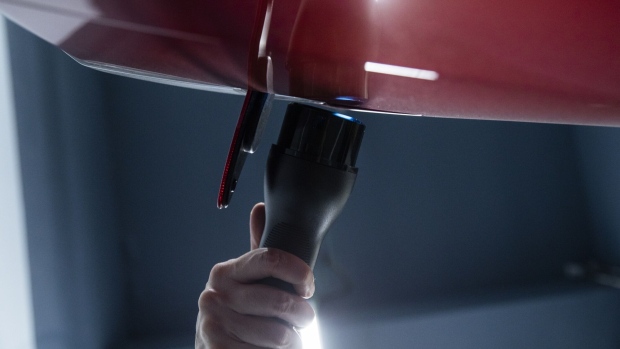Jun 9, 2023
China Mounts Six-Month Campaign to Get Car Sales Moving Again
, Bloomberg News

(Bloomberg) -- China launched a six-month campaign to boost car purchases and drive electric vehicle adoption in rural areas as sales growth of EVs slows in the world’s biggest autos market.
The push, coordinated by the Ministry of Commerce, starts this month and will encourage financial institutions to provide credit support for car purchases and local governments and automakers to offer subsidies and discounts, especially on EVs, according to a government statement late Thursday.
One key priority is to promote EV adoption in the more than 11,000 counties and villages around China, with Beijing pledging to improve charging infrastructure in rural areas and nudge local authorities to launch support measures such as consumer subsidies, the statement said.
Top officials in China have repeatedly said they see EV adoption and spurring sales of cars more generally as very important this year. Earlier this month, the State Council said it would extend a tax break for new-energy vehicle purchases, while in May, the country’s economic planning agency and the bureau of energy issued a call for the building of more charging infrastructure outside of big cities.
China is the world’s largest market for green cars, seeing a 95% increase in the segment last year versus 2021. But the momentum is losing steam, with sales of EVs and plug-in hybrids rising 41% from January to May, a much slower pace than the 120% growth for the same period of 2022. The overall autos market was up slightly in the first five months of this year, increasing 4.2%, according to the China Passenger Car Association.
“This is like mounting a massive advertising campaign for the autos industry,” said Yale Zhang, the managing director for Shanghai-based consultancy Automotive Foresight.
Subsidies vary by region and it’s not clear how much will be provided for car purchases at a time when many local governments are managing tight budgets and soaring debt.
Nanjing, a second-tier city in eastern China with a population of 9.5 million, said it will give out 35 million yuan ($5 million) in car consumption vouchers from June 6, providing up to 5,000 yuan for each qualifying car purchase. Shenzhen, a technology and manufacturing hub, has given out about 82 million yuan to consumers who bought clean cars this year.
Some auto manufacturers are heeding the call to promote EVs in rural areas.
General Motors Co.’s joint venture with SAIC Motor Corp. and Wuling Motors Holdings Ltd. has discounted its smash-hit Hongguang Mini EV range by 13,000 yuan until the end of June. State-owned Chery Automobile Co. has offered a 1,000 yuan discount and free lifetime servicing for some of its EV models.
A price war in China kicked off by Tesla Inc. earlier this year also shows no sign of abating.
A total of 753 passenger car variants, or around 25% of all vehicle types on the market, were subject to price drops of more than 10,000 yuan in the three months through May, according to data from research provider China Auto Market. The percentage has been widening for seven straight months.
Shares in carmakers were up slightly on Friday. Stock in SAIC gained 1.4% while BYD Co., China’s biggest maker of EVs, rose 1.2% in Hong Kong. Geely Automobile Holdings Ltd. climbed 1.4%.
--With assistance from Catherine Ngai.
(Updates to add chart and context.)
©2023 Bloomberg L.P.





